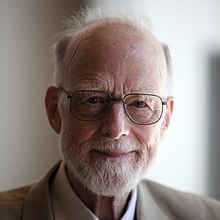| 90th Birthday Of Tony Hoare |
| Written by Sue Gee |
| Thursday, 11 January 2024 |
|
British Computer Scientist Tony Hoare has made numerous contributions that have revolutionized computer programming, including the QuickSort algorithm, Hoare logic and the formal language, CSP. Today, January 11th 2024, is his 90th Birthday. Sir Charles Antony Richard Hoare FRS, FREng, better known as Tony Hoare, is Emeritus Professor of Software Engineering at the University of Oxford and Consultant Principal Researcher at Microsoft Research in Cambridge. The letters after his name signify he is a Fellow of the Royal Academy of Engineering and a Fellow of the Royal Society which last year, 2023, awarded him the Kings Medal with the citation: for groundbreaking contributions that have revolutionised the computer programming field, the development of "Hoare logic" that has paved the way for provably correct code, providing a robust framework for ensuring software reliability.
Tony Hoare in 2011
Born on 11 January 1934 in Colombo, Ceylon (now Sri Lanka), Tony Hoare was educated in England. His first degree was in Classics at Merton College, Oxford and he remained at Oxford University a further year studying statistics and incidentally took a course in programming given by Leslie Fox, who had set up the Oxford University Laboratory in 1963. He later studied the machine translation of languages at the Moscow State University with Andrey Kolmogorov where he came up with the Quicksort algorithm to assist in efficient look-up of words in a dictionary. It was later, during a course on the programming language ALGOL 60 (given by Edsger Dijkstra, Peter Landin and Peter Naur) that Tony saw that the concept of recursion was the key to lucid expression of Quicksort. On return to England in 1960, he worked as a programmer for Elliott Brothers, a small scientific computer manufacturer. There he led a team (including his later wife Jill) in the design and delivery of the first commercial compiler for ALGOL 60. He attributed the success of the project to the use of Algol itself as the design language for the compiler, although the implementation used decimal machine code. In 1968 Hoare moved into academia and was Professor of Computing Science at the Queen's University, Belfast. His research goal was to understand why operating systems were so much more difficult than compilers, and to see if advances in programming theory and languages could help with the problems of concurrency. It was while at Belfast that he devised Hoare logic, a system for rigorously proving the correctness of computer programs that built on the work of Robert W. Floyd, who published a similar system for flowcharts. In this video clip taken from an interview conducted by Cliff Jones for the ACM in 2015, Tony Hoare discusses the definition, origin and purpose of the "Hoare Triple": In 1977 Hoare moved to Oxford University where he built up the Programming Research Group, founded by Christopher Strachey. His research at Oxford and there returned to his interests in concurrency and proposed the concurrent programming language CSP which was outlined in his seminal paper "Communicating Sequential Processes", included in Communications of the ACM, Vol. 21. No. 8. 1978. CSP was influential in the development of the transputer machine architecture and in the design of languages such as Occam and Erlang and most recently Go, the latest language to acknowledge its debt to Hoare's work. Tony Hoare was knighted for services to education and computer science in 2000 and has accumulated many awards. These include the A. M. Turing Award (1980) from the Association for Computing Machinery, the Kyoto Prize for Information Science (2000) and the IEEE John von Neumann Medal (2011). He was inducted as a Fellow of the Computer History Museum in 2006. More InformationTony Hoare - University of Oxford, Dept of Computer Science C. ANTONY ("TONY") R. HOARE - ACM Related articlesBirthday Greetings to Discoverer of Quicksort To be informed about new articles on I Programmer, sign up for our weekly newsletter, subscribe to the RSS feed and follow us on Twitter, Facebook or Linkedin.
Comments
or email your comment to: comments@i-programmer.info
|
| Last Updated ( Friday, 12 January 2024 ) |



